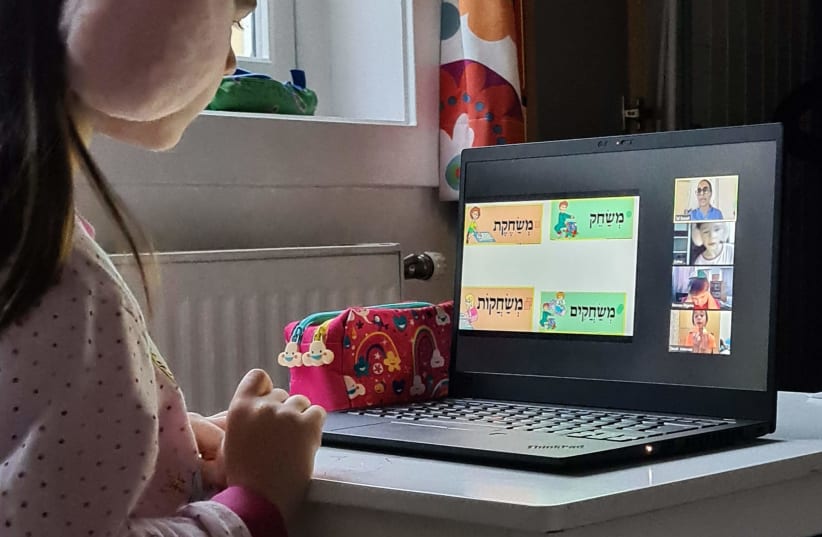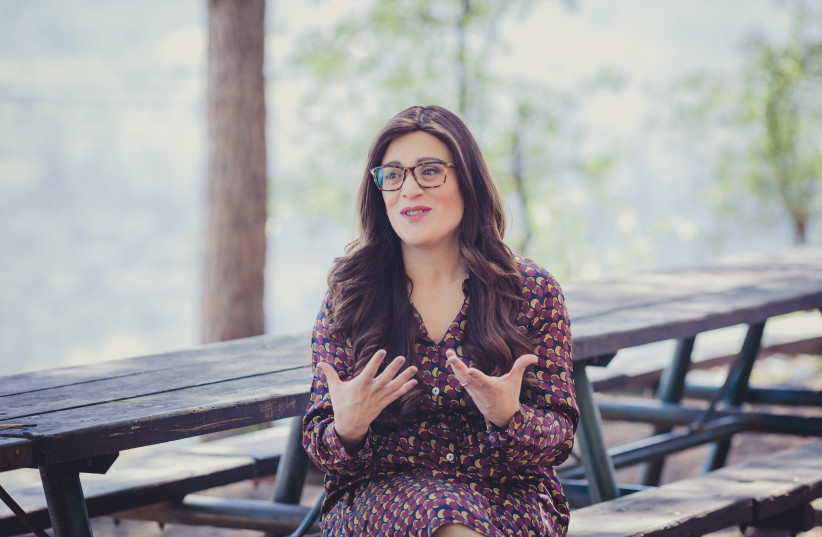“People don’t realize the crazy power of online,” says Tal Bassali.
If anyone can truly appreciate the internet’s “crazy power,” it is the 41-year-old Bassali who founded Zehud, a unique Jewish online school, in 2016, years before the boom in virtual education caused by the pandemic. Cheerful, passionate, and enthusiastic, Tal Bassali is dedicated to improving Jewish education in Europe, particularly among Jewish youth in smaller Jewish communities on the continent.
How did London-born Bassali, who lived in Petah Tikva for 12 years, end up as the head of a virtual Jewish school? And if a virtual school can have physical headquarters, how did it end up being in Venice, Italy, which has a Jewish population of just 450?
I learned the answers to these and other questions in a wide-ranging interview with Tal and members of the Zehud team, conducted via Zoom, of course, between communities in Israel and Italy. Tal made aliyah with her parents from the UK in 1992 and moved to Venice shortly after she married her Italian-born husband, Moshe Bassali, in 2005. At the time, they assumed that they would live in Italy for a year or two, and then return to Israel. Moshe’s family was involved in the jewelry industry in the Veneto region, and he planned on working there for a brief period. Fifteen years and three children later, Tal and Moshe, are full-time residents of the tiny Jewish community of Venice and live just outside the historic ghetto, which remains a center of Jewish life in the city. “We thought we would move back to Israel after a couple of years. That’s not what happened,” she laughs.
Once they decided to stay, Bassali was confronted with a somewhat more serious issue – providing a Jewish education for their children in a community with limited educational resources. “I was getting anxious about their education,” she recalls. “This was before online and Zoom and corona. It was in different times when people went to school on their own two feet. I was trying to figure out a way to get quality Jewish education for our children.”
Tal and Moshe sent their two oldest children to a Chabad kindergarten for two years until it closed. She noticed, though, that the children had become fairly proficient in Hebrew at the kindergarten. The Bassali family, a bilingual family speaking English and Italian, had now become trilingual. “I was happy that they had learned Hebrew, but it was not by design, but rather by chance.” By 2014, Tal, who did not have any background in education, began to look into various online Hebrew learning programs and learned about iTaLAM, a digital blended learning environment based on the popular TaL AM curriculum originally developed by a team of educators in Montreal and Israel. iTaLAM, which was developed with the support of the Avichai Foundation, is used by hundreds of schools outside Israel and utilizes games, music, and visual aids to help students learn the Hebrew language and Jewish heritage. The program is taught entirely in Hebrew, thus immediately immersing students in the language.
Tal got in touch with Yael Dahan, who worked on the iTaLAM project for the Avichai Foundation and who was the coordinator of the program for Europe and Asia. Dahan suggested that her children could use the iTaLAM program to learn online. Bassali’s two oldest children began learning each week online with teachers trained to teach with the iTaLAM material. The following year, the Bassalis added the children of friends who wanted to join, thereby sharing the cost among two families. By then, they were up to six children. In 2016, Zehud officially came into existence. Bassali explains that the name “Zehud” originates from Judeo-Venetian and means privilege. The word blends three concepts and similar-sounding words – the “Zechut” (merit) to study Jewish tradition and Hebrew language; the “zehut” (identity) of Jewish youth, which is strengthened by their study of Hebrew and Jewish values; and “Yeud” (destiny) because education is is a cause of change in the Jewish world and the choices that people make in their Jewish lives.
The program has been growing steadily each year, and for this coming school year, which begins in early September, the Zehud school (http://school.zehud.com) will have 100 students from sixteen different countries, including Costa Rica, Croatia, Finland, France, Germany, Italy, Mexico, Nigeria, Norway, Montenegro, Romania, Spain, Switzerland, Uganda, United Kingdom, and Zimbabwe, all studying the iTaLAM program virtually on Zoom. Classes meet live, twice weekly, and each class lasts an hour. They are recorded, so if students miss a lesson, they can watch them later.
Bassali is enthusiastic and passionate about the need to educate Jewish children in Europe and notes that of the approximately 1.3 million Jewish living in Europe today, more than half are based in countries that lack a Jewish communal infrastructure. “Young families with children are the most underserved demographic in the European Jewish community,” she says.
“The beauty is for me trying to figure out how to make Jewish education work in Europe,” says Tal. “The majority of communities in Europe are small and medium and don’t have a Jewish school. They have a Heder or Talmud Torah – they have something, but they all complain of the same ailments,” she adds.
Bassali says that most small communities don’t have a critical mass of children and have little professional help or talent available. “I’ve taken a collection of children and organized them by age and stage,” she says. Bassali adds that the most critical key is teaching the students in Hebrew and attaining Hebrew language proficiency, “so that everyone is learning in the same language, because language in Europe is a real issue.” Bassali says, “If you take a five-year-old and teach fully in Hebrew, I can tell you, it’s done.” Pointing to her head, she says, “It’s in there. Kids learning a language is the most amazing thing to watch.”
Using the iTaLAM program, students learn Hebrew and then study concepts in Judaism, including Jewish holidays, Bible, Shabbat, and the weekly Torah portion. Bassali, who herself is observant, says that the program is post-denominational. “There are too few of us here, so we try to focus on what we have in common, and if that means sitting at a Shabbat table together – then that is what we do. We seek to maximize our Jewish experiences, which is why our school is set up completely in Hebrew. With a common language, we can be sure we will be able to experience more common Jewish experiences as we will share communication and concepts.”
Bassali says that there are many applicants for positions teaching in her school because the teachers don’t have to relocate physically. There are currently seven teachers in the school, including one in New York, one in Hong Kong, one in Berlin, and four in Israel.
Much of the educational expertise for Zehud comes from Israel. Yael Dahan, a resident of Shoham, who has had many years of experience in the development of iTaLAM, is responsible for the Hebrew and Jewish studies curriculum for grades 1-5.
Rav Johnny Solomon, an educator who made aliyah from London nine years ago, is a consultant for Zehud and teaches Mishnah, Talmud, and Jewish philosophy.
The newest addition to the Zehud team is Adina Schwartz, Ph.D., who has extensive experience in school management, and who has recently been appointed educational principal of the school to help Bassali in the administration and overall direction of the school.
Solomon explains that Zehud is more than just teaching – it is also about creating a community. “We engage families through educating their children. Parents send their children to their school because they want to enrich their child’s Jewish identity. This isn’t a child separate from their parent coming to a school – this is a family who wishes to enrich their homes, some of them living quite independently from Jewish communities. We are educating the children but also recognizing that the parents are hungry for a Jewish connection, so we talk to them about Jewish education as parents. We coach them as parents to be a supportive framework for their child’s learning, and we acknowledge that by sending their child to Zehud, they want to grow, and we want to be there for them.”
There are other online Jewish educational programs in the world, but what makes the Zehud program unique is that it has become the full-time mission of one woman, who wanted to educate her children, and by extension, the Jewish youth of Europe. “I want every family in Europe to know that if they want to give their child a high-quality Jewish education, that it is available to them,” says Bassali. “The majority of families feel it is not available to them. I want them to know that there are choices.” What is the future of the Zehud online school?
Bassali adds, “We want to be the biggest Jewish school in Europe – not because I want to be the biggest school in Europe, but because I want to have the biggest impact.”■

